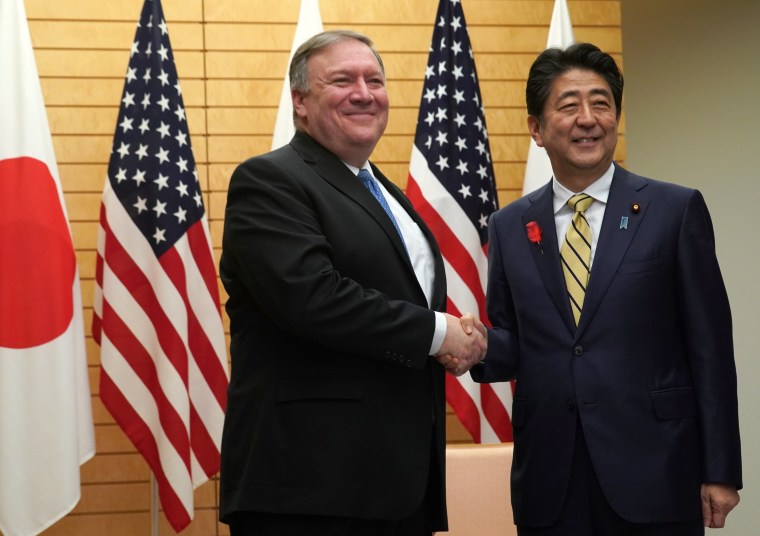TOKYO — Secretary of State Mike Pompeo pledged Saturday that the Trump administration's effort to get North Korea to give up its nuclear weapons would be fully coordinated with allies Japan and South Korea, as he prepared to travel to Pyongyang under pressure to produce tangible progress toward that goal.
Pompeo met Japanese Prime Minister Shinzo Abe in Tokyo on the eve of his fourth visit to North Korea, during which he'll be looking to arrange a second summit between President Donald Trump and North Korean leader Kim Jong Un and plot a path forward on denuclearization.
Japan, notably, has been wary of Trump's initiative, fearing it could affect its long-standing security relationship with the U.S.
Pompeo told Abe that it is important for him to hear from the Japanese leader "so we have a fully coordinated and unified view" and vowed to raise the cases of Japanese citizens abducted by North Korea when he sees Kim and officials in Pyongyang on Sunday.
Pompeo will then travel to South Korea and China to review the negotiations.
In Beijing, Pompeo will face tensions over trade and accusations of election interference. In contrast, his meetings with Abe and Foreign Minister Taro Kono were expected to be more relaxed.
Pompeo also said ties between Japan and the United States were strong and the two countries were in a position to make progress on trade talks.
But his real diplomatic test will come in Pyongyang. He is expected to meet with Kim Jong Un and one of his most trusted aides, Kim Young Chol, a former intelligence official.
Pompeo's diplomatic offensive comes as Trump presses to meet with Kim for a second time after their June summit in Singapore produced a vague agreement on denuclearization with few, if any, specifics. Despite the historic meeting, the two sides are deadlocked over how to achieve that goal and Trump canceled Pompeo's initial planned return to North Korea last month.
In contrast with South Korea, whose President Moon Jae-in has been at the forefront of encouraging Trump's rapprochement with the North, Japan has been decidedly cautious, insisting that its interests and concerns be addressed.
Abe did not speak of differences but highlighted the importance of demonstrating to the world that the U.S.-Japan alliance is "more robust than ever" and stressing the importance of "thorough coordination" with Washington on all aspects of North Korea policy.
Pompeo has repeatedly refused to discuss details of negotiations, including a U.S. position on North Korea's demand for a declared end to the Korean War.
Speaking aboard his plane on Friday, Pompeo said his mission was to "make sure that we understand what each side is truly trying to achieve ... and how we can deliver against the commitments that were made" in Singapore. He said they would develop options, if not finalize, the location and timing of a second Trump-Kim summit.
He has also distanced himself from an earlier stated goal of achieving North Korea's nuclear weapons abandonment by the end of Trump's term in January 2021.
Since the effort got underway with a secret visit to the North by then-CIA chief Pompeo in April, there has been only limited progress.
Pompeo's last visit to North Korea ended with Pyongyang denouncing him for making "gangster-like demands."
North Korea so far has suspended nuclear and missile tests, freed three American prisoners and dismantled parts of a missile engine facility and tunnel entrances at a nuclear test site. It has not taken any steps to halt nuclear weapons or missile development.
On Friday, North and South Korea held a high-level meeting in Pyongyang to discuss the implementation of agreements their leaders made at a summit last month, which included reducing threats between their militaries. North Korea also said it may dismantle its main Nyongbyon nuclear complex if the U.S. takes unspecified corresponding measures.


